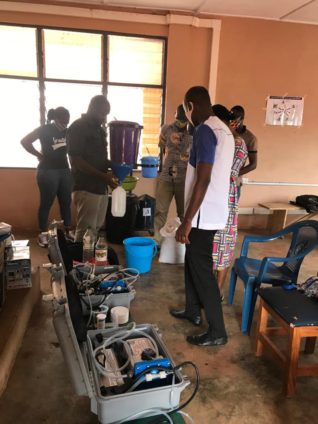Some 43 health facilities in northern Ghana have received cost-effective intervention from the Catholic Relief Services (CRS) to prevent and control infections.
The 'No Breach' in chlorine supply for health care facilities project, ensures continuous supply of quality chlorine to improve infection prevention and control (IPC).
With internal funding, CRS has been able to provide 4 health facilities with electrochlorinator equipment to produce and supply chlorine to 43 health facilities in West Mamprusi Municipal and Talensi District.
Our Lady of Rocio in Walewale produces and supplies chlorine to 13 health facilities in West Mamprusi Municipal, Tongo Hospital attends to 14 health facilities, Duusi Health Center takes care of 6 facilities and Datuku Health Center also serves 6 health facilities in the Tongo Districts.
According to Senior Project Officer – WASH at Catholic Relief services, Festus Barfi Fofie, “2,590 liters of chlorine has been produced by the four sites, of which 1,955 liters have been distributed for use."
The program has reduced the burden of hospital-acquired infections through the use of the on-site chlorine generators for improved infection prevention and control (IPC) practices.
Mr. Fofie said, the STREAM Electro Chlorinator equipment are safe, reliable, easy-to-use and feature low operating and maintenance costs.
"The STREAM Electro Chlorinator equipment unit is fully automated ensuring a consistent chlorine concentration of 0.5% or 5,000 mg/l, which is the standard concentration for cleaning hospital settings, disinfection of surfaces and floors, disinfection of instruments and also for treatment of water. The unit also produces chlorine at a rate of 5 liters per hour.”
One of the key challenges at the Duusi Health Center was delay in providing bleach (or liquid chlorine) from the District Health Administration through the Central Medical stores.
"Sometimes the medical stores can choose not to give you the number you requested," John Afrane who is the In-charge at the Duusi Health Center said.
Mr. Afrane said that since the intervention, they only need salt and water to produce their own chlorine for disinfection purposes.
Duusi Health Center can now produce the quantity of chlorine required for the facility and also supply other health facilities within the sub-district.
"Now we don't think about bleach, especially in this Covid-19 era," he added.
Since the outbreak of Covid-19, demand for chlorine from the Upper East Regional Medical Store has increased.
Every facility is dependent on the store, and this results in inadequate supply.
"Since the chlorinator came, we can now effectively disinfect the facility."
Authorities at the Duusi Health Center levies facilities that rely upon them for the chlorine to ensure the project's sustainability.
The situation at the Datuku Health Centre was not different until Catholic Relief Services came to the facility's aid with the STREAM electrochlorinator equipment.
Nurse and WASH focal person at the facility, Richard Akurugu, said “things have changed for the better”.
"Our facility has benefitted because we got a full package," Sandra Anabire, midwife at Datuku Health Centre added.
Health centres and clinics need between 35 and 75 liters of 0.5% chlorine per day for disinfection whereas CHPS compounds require 15 to 25 liters of 0.5% chlorine in a day.
"Health facilities have expressed willingness to pay an average of GH2.83 for 5-litre gallon of 0.5% chlorine, using IGF and NHIS funds," Mr. Fofie indicated.
The Covid-19 pandemic has reinforced the need to support the capacity of health facilities to maintain effective infection prevention and control (IPC) practices on daily basis.
Disinfectants like chlorine are essential products that can enhance effective IPC practices and reduce risk of disease transmission at health facilities.
But some health facilities in Ghana reported interruption in chlorine supply; forcing them to procure bleach of unknown quality on the local market or to ‘save existing stock’ because of uncertainty about the next supply from central medical stores.
Chlorine stock-out days of between 55 to 74 days in a year have been recorded, which poses a major risk to disease transmission.
Price inflation of chlorine and bleach on the open market was also estimated to be a risk and affected chlorine supply.
It is reported that health facilities using self-produced sodium hypochlorite were saving between EUR 2.7 and 5.3 per day depending on the size of the facilities as opposed to those who relied on other sources.
Lives of patients and health workers have been transformed in the last year.
Healthcare Associated Infection (HAI) rates have also been observed to be on the decline and will require more data to further establish the fact.
Latest Stories
-
Retain Afenyo-Markin as NPP leader, he has experience – Deputy Speaker
3 minutes -
Kufuor didn’t leave behind a strong economy – Fifi Kwetey
6 minutes -
It won’t be business as usual, remain humble – Fifi Kwetey to party members
1 hour -
Ebenezer Ahumah Djietror appointed as new Clerk to Parliament
2 hours -
Actress Benyiwaa of ‘Efiewura’ TV series dead
2 hours -
Ashanti Regional Chief Imam dies at age 74
3 hours -
Africa Arts Network calls for tax reform to save Ghana’s theatre industry
3 hours -
SSTN Ghana Chapter reaffirms commitment to economic growth under new leadership
3 hours -
Inlaks strengthens leadership team with key appointments to drive growth across sub-Saharan Africa
4 hours -
Green Financing: What Ghana’s Eco-startups need to know
4 hours -
CHAN Qualifiers: Amoah confident of beating Nigeria
4 hours -
Governments deprioritising health spending – WHO
4 hours -
Lordina Foundation brings Christmas joy to orphans
4 hours -
Yvonne Chaka Chaka to headline ‘The African Festival’ this December
4 hours -
Nigerian man promised pardon after 10 years on death row for stealing hens
4 hours

